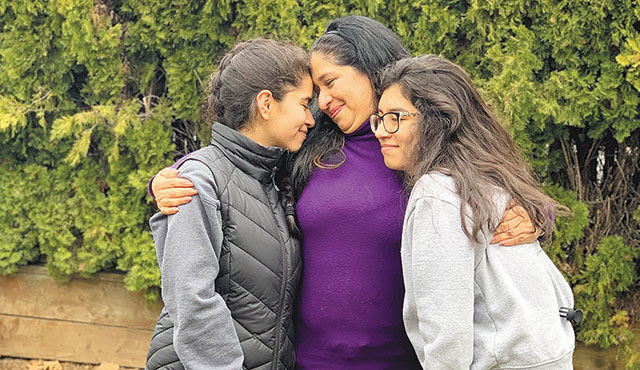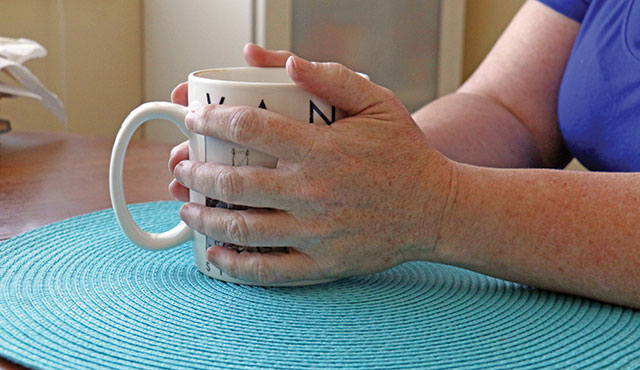Finally came the release, the realization. It’s not me . . . it’s him. . . I am worthy of love, God’s and man’s. One spring morning, my heart was filled with hope and with fear now only of starting over on my own. And so again I walked . . . down the hallway of our apartment building . . . never again to be silent . . . never again to live with that kind of violence, to suffer that kind of pain.
—A battered wife
With an unshakable belief in life itself and the sanctity of each individual, the Catholic Church provides a safe haven for victims of domestic violence.
“Domestic violence is far too common, affecting women and men, teenage dating relationships, children, and the elderly,” says Bishop Kevin Vann in a statement about the issue. “Within Orange County, domestic violence is occurring even in our parishes and centers, across all ethnic and economic backgrounds. Domestic violence is a family issue and a pro-life issue: our families are being torn apart and lives are being lost.”
One in three women will experience some kind of domestic violence in their lifetime, notes Linda Ji, who directs the diocesan Office of Pastoral Care for Families in All Stages. It requires conscientious clergy utilizing a variety of tools to detect signs of domestic violence in couples and families, she explains.
“One important thing to point out is that a lot of people think of this issue as limited to physical violence,” Ji adds. “But domestic violence includes any kind of abusive relationships where a partner or parent is exerting power over another – it can be psychological, sexual, verbal, financial, and emotional in nature as well.”
Because the issue is widespread and complex, the diocese encourages parish priests and lay volunteers to watch for signs as they confer the sacraments and witness relationship dynamics.
In a video sermon on the diocesan website, Rev. Charles W. Dahm, O.P., of the Archdiocese of Chicago, suggests that the Church approach domestic violence victims as Jesus would.
On the U.S. Catholic bishops’ website, they write, “As pastors of the Catholic Church in the United States, we state as clearly and strongly as we can that violence against women, inside or outside the home, is never justified. Violence in any form – physical, sexual, psychological, or verbal – is sinful; often, it is a crime as well. We have called for a moral revolution to replace a culture of violence.”
Victims are referred to domestic violence agencies, spiritual advisers, mental health professionals, local ministries, or women’s organizations for safety, support, and treatment, Ji says. A variety of helpful links and videos about domestic violence are available at the Diocese of Orange and U.S. Conference of Catholic Bishops websites: rcbo.org and usccb.org.
One key way the diocese addresses domestic violence is to try to prevent it, she adds. “If done well, marriage preparation programs can detect early signs, help couples in bad situations, and stop bad relationships from continuing.”
Fred LaPuzza, director of the diocesan Office of Restorative Justice and Detention Ministry, notes that about 90 percent of the individuals incarcerated in Orange County jails and juvenile detention facilities have experienced some form of domestic violence – and it potentially is the root cause of criminal behavior.
“We have a saying, ‘Hurt people hurt people,’” LaPuzza says. “We give them a safe place to talk about the issue. It’s very healing for people to be listened to, especially in a correctional environment where they can’t talk openly about this with other inmates.
“Most of the people we work with haven’t experienced healthy love or healthy relationships,” he observes. “They’ve witnessed violence or had violence directed at them. They don’t feel loved by God or by anyone else.”
Both the diocesan and U.S. Bishops websites offer spiritual, mental health, and scriptural links in support of domestic violence victims, and the rcbo.org site lists these domestic violence shelters and abuse hotlines:
- Human Options 877-854-3594
- Interval House 562-594-4555; 714-891-8121; 800-978-3600
- Laura’s House 949-498-1511; 866-498-1511
- Women’s Transitional Living Center 714-992-1931
Jesus spent much of His time healing people, LaPuzza notes. “The populations we serve have experienced years or even decades of trauma,” he says. “Being incarcerated is a continuum of trauma. Victims of domestic violence also live in a continuum of internal incarceration, locked up by the burden of pain and hurt they carry.
“Following the example of Jesus, our task is to help our incarcerated populations see they are worth being loved by God and domestic violence victims to see that what has happened to them is not their fault and certainly not God’s will for them.”
“Helping them to even think in this direction opens a transformative door to begin healing and a more sustainable recovery.”


